- Home
- Bette Lee Crosby
Beyond the Carousel Page 9
Beyond the Carousel Read online
Page 9
Five years passed, years that were frequently filled with difficulty and hardship. Despite President Roosevelt’s New Deal, there was no end in sight to the Depression. Worried the money Franklin left would not carry them through to better times, Laura, like everyone else, cut back and made do with less. Instead of going out to dinner or taking trips to Richmond, they borrowed books from the library and sat in front of the fireplace reading or talking about the happier times.
On nights when news of the world felt heavy on her heart and loneliness was wrapped around her like a second skin, Laura and Christine walked over to Chester Street. Although coffee was costly, Rose brewed a pot and added an extra spoonful of sweetness to each cup.
“It always makes me feel good to come here,” Laura said as she and Rose sat at the table talking.
It seemed that no matter how heavy Laura’s heart was when she arrived, it would be a bit lighter when she left.
* * *
In 1937 when Christine was in the fifth grade, Rose passed away. It happened sometime in the middle of the night, but exactly when Emory couldn’t say. That morning, believing her still asleep, he climbed out of bed and dressed for work. When he walked back to kiss her goodbye, he found her cheek cold and lifeless.
It was a heart attack that came about with no warning. A number of times she’d complained about indigestion, but after taking a spoonful or two of Phillips Milk of Magnesia she supposedly felt better.
When Emory came and told Laura, she collapsed into his arms.
“How can that be?” she cried. “Mama and I were planning to roast a chicken for Sunday.”
The night before it happened, Laura sat across the kitchen table from Rose and talked of how she wished Franklin could have seen Christine growing up as she was.
“He would have been so proud of her,” she said wistfully.
“He knows,” Rose replied. “You’ve said so yourself. He watches over you every day. If he watches over you, he sees Christine as well.”
Laura smiled at such a thought.
Rose was laid to rest on the coldest day Wyattsville had ever seen. The morning broke with icicles hanging from trees, fire hydrants leaking and hoses that had been left out in the yard split open. Before they reached the cemetery, snow flurries started. It was not enough to cover the ground, but, driven by a cold wind, it was enough to sting Emory’s face and leave his feet feeling frozen. He stood beside the grave with one arm wrapped around Laura, the other around Christine and a trail of frozen tears stuck to his cheek.
“First Franklin, now Mama,” Laura said just before breaking down in sobs.
Although Emory’s own heart felt like a chunk of ice splintered into a thousand shards, he tightened his grip on her shoulders.
“We’ll get through it,” he said. “We’ve been through hard times before.”
“Maybe so,” she said, brushing back a tear, “but why is it that the people we love are the ones who die?”
Laura had always been close to Rose, but in the years following Franklin’s death they’d grown even closer. Emory knew this and gave her a bittersweet smile.
“Sooner or later everyone dies,” he said, “but when it happens to someone we love a piece of our heart dies with them, so we stop and take notice.”
He gave a nod to the line of gravestones that stretched as far as the eye could see. “I imagine every one of those buried here was somebody special to someone.”
“Maybe so,” Laura replied, “but I doubt anyone was as special as Franklin and Mama were to me.”
Once Rose was gone, Laura felt emptier than ever before. It seemed almost impossible to find a bit of brightness in her life other than Christine. When she wasn’t thinking about the injustice of losing both Franklin and her mama, she was fretting about Emory being by himself.
Often in the middle of the day, she called to ask if he’d eaten breakfast. If he answered yes, then she’d ask about lunch.
“I worry about you being alone,” she’d say. “I have Christine to keep me company, but you have no one.”
Unaccustomed to being fussed over in such a way, Emory brushed such questions aside like a flock of pesky mosquitos.
“I have eaten, cleaned my teeth and gone to the toilet,” he’d say, “and now if you don’t mind I am trying to listen to my radio show.”
No matter how many times he gave that answer, Laura continued to pester him. On the evenings when she came with a casserole for his supper, she asked after him. And on mornings when she’d bring fresh-baked muffins, she’d ask again. Each time Emory shook his head claiming it was something he didn’t want to discuss.
“You’ve got your life, and I’ve got mine,” he said.
“Without Mama it’s not much of a life,” Laura argued, but there was no convincing him.
For over a year he remained in the Chester Street house by himself. He did little more than sleep there, because almost every waking moment he was either at the office or looking for something to do at Laura’s house. When he could no longer find something that needed to be painted, repaired or oiled, he built a bookcase for Christine’s room. He also taught her how to play pinochle and, when the weather turned warm, how to fish.
That summer he took a group of her giggling girlfriends to his favorite fishing hole, and instead of dropping a line in the water and leaning back to wait for a nibble he spent the afternoon putting fresh worms on hooks and untangling lines. He also escorted Christine to the Girl Scout father-daughter dance.
* * *
In 1939 Emory turned sixty-five and was forced into retirement. He was given a pension, considerably less than he’d been making but enough to get by on. At that point Laura told her daddy him not living with them was pure foolishness. Rumors of the United States going to war were already being spoken aloud, and Laura had started working with the Bandages for Britain volunteers rolling balls of gauze and packing boxes to be shipped overseas.
“I don’t like the thought of Christine coming home from school to an empty house,” she said. “What if something happens when I’m not here? Who knows what trouble a teenage girl can get into?”
The thought of Christine in need of anything stuck in Emory’s head, and after weeks of consideration he finally agreed to move in. By then the Depression was nearing an end and although America was starting to feel the bustle of a pre-war economy, a lot of people were still out of work so the market had way more sellers than buyers. After six months of strangers traipsing in and out of the rooms, poking through cupboards and finding fault where there was none, he finally sold the house to a middle-aged couple who offered him half of what he’d originally paid for it.
The closing was on the last Friday of September. When they handed Emory the cashier’s check, he took it and deposited it in Laura’s bank account. Once that was done he loaded his suitcases into the back of his car, drove to Laura’s house and moved into the guest room.
Later that evening he handed her the deposit slip and said, “You’re going to need this for Christine.”
She took one look at the amount and gasped. “Daddy, you shouldn’t have—”
“I’ve got my pension, and that’s more than enough. I won’t always be around to see to your needs, so keep the money and use it for whatever you and Christine need.”
Laura’s eyes filled with water, and a tear rolled down her cheek. She wrapped her arms around Emory and laid her head against his chest.
“You’re the best daddy in all the world,” she said through her sniffles.
Emory, who was not given to such a show of emotion, mumbled, “No, I’m not. I’m just doing what your mama would have wanted.”
Little of their day-to-day life changed, because he’d been spending most of his time there anyway. The only change anyone might notice was that he became even fonder of Christine. Although he’d been busy working when Laura was growing up, he now had all the time in the world and he spent most of it doting on his granddaughter.
He insisted on driving her ev
erywhere she wanted to go and personally meeting any boy she dated. By then she was a freshman in high school, but the boys she dated were just that: boys. They’d stand with their shoulders rounded and pimply faces expressionless as Emory warned them about trying any “funny business” with his granddaughter.
When he did it, Christine inevitably turned red-faced and exclaimed, “Granddaddy!”
On the evenings when she was out with her friends, he sat in the living room and waited until she was home before going to bed. Once when Christine spent the night at a classmate’s slumber party, he paced the floor until almost dawn. Laura told him there was nothing to worry about, but still he worried.
“You’re certain this classmate is a reputable girl?” he asked.
“Yes,” Laura answered, explaining that she worked with the girl’s mama. “There’s absolutely nothing to worry about. The girls just like to get together and have fun. They’ll stay up most of the night and do silly things like paint their nails or talk about boys.”
“Boys?” Emory repeated nervously.
A Time of War
The Japs bombed Pearl Harbor in December of 1941, and before the week was out America was at war. Fathers, sons and brothers enlisted, and women stepped in to fill the jobs they’d vacated. Laura was one of those women. After only a few weeks of training, she became a stamper in the same steel mill George Feldman had once worked in. The first week she joined the production line, she took to asking fellow employees if they’d ever heard of Feldman. One by one they shook their heads.
“Well, if you hear of him working in another plant, let me know,” she’d say.
Although over a decade had passed, Laura never gave up hope that one day her husband’s murderer would be found and brought to justice. If she could be the one to make it happen, so much the better.
* * *
Overnight Wyattsville went from being a sleepy little town to a place where everyone was involved in the war effort. That summer victory gardens began to blossom in almost every yard, and Emory found a new purpose in life. After he’d planted corn, tomatoes, beans and radishes for Laura, he planted five rows of corn and two of summer squash for the Widow Watkins. Then he helped Pastor Ingersoll set up a garden on the back side of the church property.
Emory volunteered to tend the gardens of working women whose husbands had gone off to war. He bought a wheelbarrow, filled it with the things he needed, then went from house to house spreading fertilizer and pulling weeds. After a day of such work, he’d come home whistling a happy tune. Seeing the mud caked under his fingernails only served to make Emory feel he was making his own contribution to the war effort.
Now in her last year of high school, Christine was relieved to be out from under her granddaddy’s stringent supervision. That summer while he was off gardening, she signed up as a junior hostess at the USO on Sycamore Street. She went directly from school and stayed as late as seven and sometimes eight. When Emory questioned why she was so late getting home, Christine said she was working for the war effort and gave her mama a sly wink.
That summer reminders of the war were everywhere. Everyone, including the radio newscasters, spoke of it, and if someone didn’t hear news of it the rationing coupons they needed to buy most anything reminded them. There was no escaping the war, and yet these were relatively happy years at the Wilkes house. Emory felt useful and appreciated, Laura was busy working at the factory and without her granddaddy watching her every move Christine was learning what it felt like to be a young woman.
In the spring of 1943 she graduated high school, and to celebrate Laura took her on a four-day vacation to Richmond. It was a trip that breathed life into all the memories they’d shared. They stayed at the Algonquin Hotel, which looked much the same as it did that last time. The chandeliers sparkled, and bellboys bustled to and fro in their red jackets. Only now there was a different feeling in the air, a tenseness that warned of danger. Instead of grand dames in all their finery, the lobby was filled with young servicemen talking and laughing as if there were no threat, as if tomorrow or the day after or a week from then the war would be gone and they would still be at the hotel.
That afternoon when the clock struck three they settled in the grand salon and ordered tea, just as they had all those years ago. Laura looked across the foyer. In the distance she saw a young man who looked very familiar from the side.
“See that gentleman in the dark suit?” she whispered. “He looks like your daddy did when we first got married.”
Christine was not yet five when Franklin was killed, and what she remembered of him was only from the pictures she’d seen. But those pictures were enough.
“Oh, Mama,” she said with a wistful sigh, “he does; he truly does.”
Laura smiled. “Your daddy was the handsomest man I’d ever met. The first time he kissed me, I knew then he was the man I’d love for the rest of my life.”
Christine never tired of hearing stories of Franklin. She leaned in and asked Laura again to tell the story of their honeymoon.
“It was the first time I’d ever been away from Wyattsville,” Laura said, “and I fell in love with this place. It was as if everything here in Richmond were magical, and your daddy made it all the more so. We stayed up until the wee hours of the morning and danced until the band stopped playing. When we finally headed for our room, your daddy danced me down the hallway singing When My Sugar Walks Down the Street, and I laughed so hard I nearly wet my panties.”
Christine had heard the stories dozens upon dozens of times, and by now she could tell them herself.
“This place is so special. That’s why you brought me here for my fourth birthday, right?”
Laura laughed. “Right. The picture of you and your daddy on the carousel was taken on that trip.”
She looked across where the young man who looked like Franklin had been standing. This time she saw an empty spot and sighed.
“There was nothing your daddy wouldn’t do for you,” she said. “When you wanted the brass ring, he was determined to get it for you.”
“Tell me the story again,” Christine urged.
“It wasn’t as easy as you might think…” Laura’s voice was soft and filled with the warmth of remembering. “Daddy held on to the pole and when the carousel circled past where the brass ring was, he leaned out so far it looked as if he were floating on air. ‘Get it, Daddy!’ you yelled. Then somehow he reached up far enough to grab hold of the ring.”
Christine’s eyes danced with happiness. “I remember.”
The truth was she was too young to remember, but she’d come to know the story through her mama’s memories.
“Would you like to go there tomorrow and ride the carousel?” Laura asked.
Christine nodded. “Oh, yes, I would.”
For four days they followed the pathway they had walked years earlier, and little by little the stories Christine listened to became her own memories. In years to come she would tell of her mama’s honeymoon as if she’d been there. On their last afternoon in Richmond, a young sailor approached Christine and asked if she’d take tea with him.
“I’m scheduled to ship out the end of this week,” he said, “and I’d love to have a nice memory to take with me.”
Christine looked to her mama.
Laura smiled and gave a nod. “Go ahead, I have some packing to do.”
As she walked off toward the elevators, Laura glanced back across her shoulder. She saw Christine’s eyes sparkling just as hers once had.
The magic of this place is still here, she thought.
* * *
As the battle on the European front worsened, news of the men lost came to the wives and mothers of Wyattsville. The morning the Western Union man brought news of Private Elliott Browne’s death, Laura skipped work and sat with Lillian throughout the remainder of that day and night.
When she wrapped her arms around Lillian’s quivering shoulders and said, “I know only too well what you’re feeling,”
the words came from her heart.
The next day she took patches of fabric from her sewing basket, stitched a gold star onto a blue background and made a small flag for Lillian. That night she delivered the flag.
“Here at home we don’t get medals for bravery,” she said, “but hang this in your front window, and it will show those who pass by that you have sacrificed as much as any man on the battlefront.”
Lillian looked at the small flag and shook her head sorrowfully.
“Pitiful exchange, isn’t it?” she said. “A single star for the father of my children.”
“I know,” Laura replied and again hugged the woman to her chest.
By the time the war ended, twelve husbands and nine sons were lost to Wyattsville. Laura cried for each of them.
During those years of sadness and heartache, Laura and Christine returned to Richmond three times. Each time it gave them a small bit of magic. Not a lot but enough to allow them to believe better days would come.
End of an Era
When the war ended, so did Laura’s job. In April of ’46 the steel mill went back to manufacturing refrigerator panels and cut back on the work force. Laura had seniority and could have stayed on, but she stepped aside so Mary Beth Monahan could keep her job. Mary Beth had two children and a husband who’d been unaccounted for. Missing in action, they said. Not dead but not coming home either.
That afternoon Mary Beth caught up to her as they were leaving the mill.
“I heard what you did,” she said and wrapped her arm around Laura’s shoulder. “I can’t ever thank you enough. If I lost this job, I—”
“It’s okay,” Laura replied and squeezed Mary Beth’s arm. “I’m looking forward to taking some time off.”
There was more than a grain of truth in what she said. Over the past few months Laura had become tired; not the kind of tired that comes from working, but the kind that settles into a person’s soul with the weight of years lived. She’d known all but four of the men lost to the war, and she’d cried heartfelt tears for each of them. It seemed as if Franklin’s death had started a landslide of heartaches, and the simple, uncomplicated world she once knew had all but disappeared.

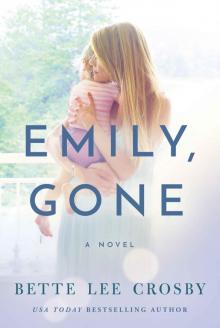 Emily, Gone
Emily, Gone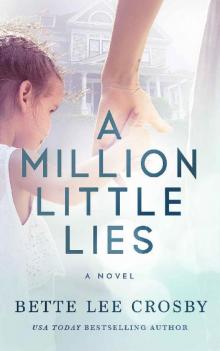 A Million Little Lies
A Million Little Lies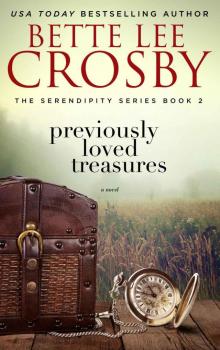 Previously Loved Treasures
Previously Loved Treasures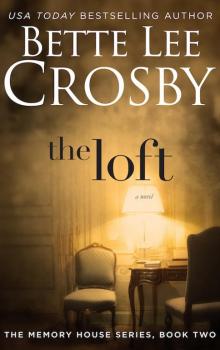 The Loft
The Loft Spare Change
Spare Change Memory House: Memory House Collection (Memory House Series Book 1)
Memory House: Memory House Collection (Memory House Series Book 1)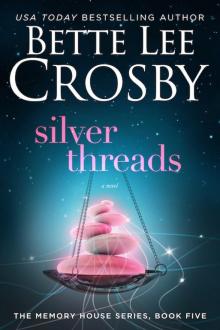 Silver Threads
Silver Threads Wishing for Wonderful: The Serendipity Series, Book 3
Wishing for Wonderful: The Serendipity Series, Book 3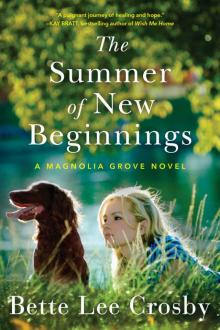 The Summer of New Beginnings: A Magnolia Grove Novel
The Summer of New Beginnings: A Magnolia Grove Novel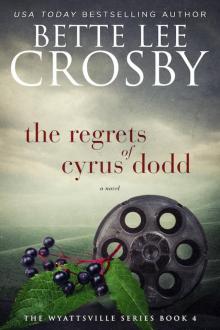 The Regrets of Cyrus Dodd
The Regrets of Cyrus Dodd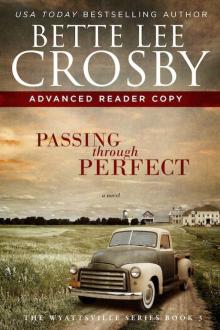 Passing Through Perfect
Passing Through Perfect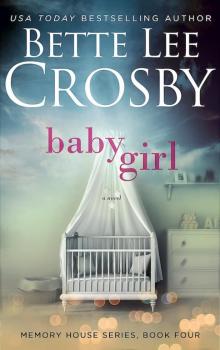 Baby Girl
Baby Girl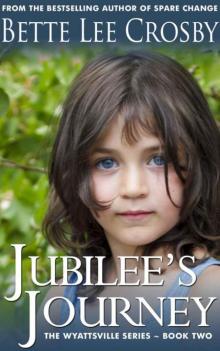 Jubilee's Journey
Jubilee's Journey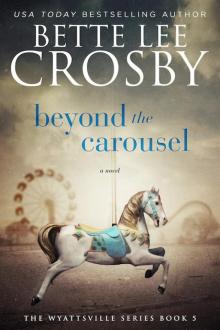 Beyond the Carousel
Beyond the Carousel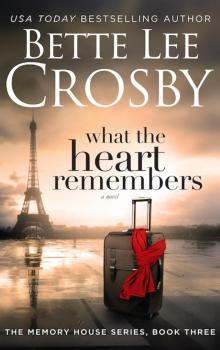 What the Heart Remembers
What the Heart Remembers Cupid's Christmas
Cupid's Christmas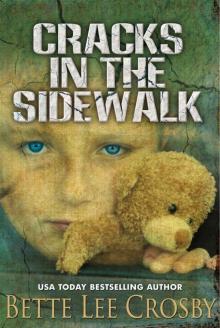 Cracks in the Sidewalk
Cracks in the Sidewalk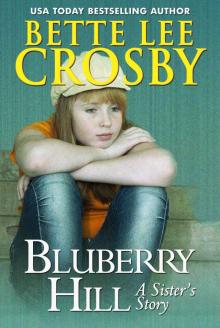 Blueberry Hill
Blueberry Hill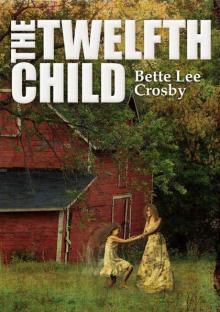 The Twelfth Child
The Twelfth Child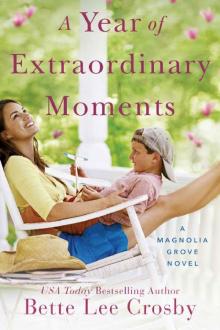 A Year of Extraordinary Moments (A Magnolia Grove Novel)
A Year of Extraordinary Moments (A Magnolia Grove Novel)